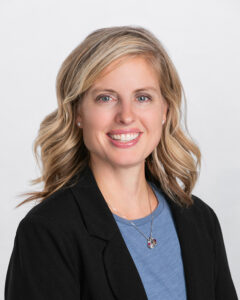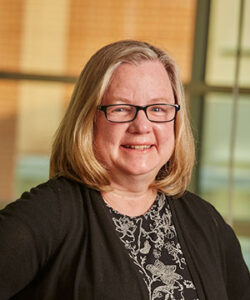Our
Clinics
Genetics & Risk Assessment Clinic
The Genetics and Risk Assessment Clinic provides individual counseling, risk assessment, genetic testing and surveillance to anyone identified as having an increased risk of cancer or those with a cancer diagnosis.
Know Yourself. Know Your Health.
Our team of genetic professionals specialize in oncology genetics and cancer risk counseling. Their expertise meets the high standards of the American College of Surgeons Commission on Cancer. They provide cancer risk assessment, genetic counseling and testing, referrals, and follow-up care for at-risk individuals.
Hear From Our Experts
Julie Thompson, ARNP-BC, a Genetic Nurse Practitioner at the Helen G. Nassif Community Cancer Center joins Dr. Dustin Arnold, Chief Medical Officer atUnityPoint Health – St. Luke’s Hospital, to discuss genetic testing.
Who Should Consider a Genetics Visit?
About 10 percent of cancers are hereditary, meaning the risk for cancer can be passed down from generation to generation. If you are concerned about your personal or family history of cancer, a genetics and risk assessment may be helpful. The following family history factors may be found in hereditary cancer:
- A family member diagnosed with cancer at an early age, usually under age 50.
- Multiple cases of the same type of cancer in a family; such as a mother, son, and grandfather all with colon cancer.
- A family member who develops two unique forms of cancer, such as breast cancer and melanoma.
- A known genetic abnormality in a family member.
A family history of cancer does not necessarily mean your risk for cancer is high. Through a genetics and risk assessment we are able to help you understand your individual risk factors. Take our Genetic Testing Questionnaire to see if you may benefit from a consultation with one of our genetic professionals.
Four Components of Genetics and Risk Assessment
-
1. Initial Assessment
You will meet with a cancer risk counselor to complete a thorough family history. Based on this history, you receive education about reducing your cancer risk factors and information regarding hereditary cancer syndromes. The benefits and risks of genetic testing, as well as possible test results, are discussed at length.
-
2. Genetic Testing
If you choose to go forward with genetic testing, your cancer risk counselor will individualize your testing based on your family’s history. Test results typically take 2-4 weeks to be completed.
-
3. Post-Test Education
Results of genetic testing are usually given to you in person. Our cancer risk counselor will schedule an appointment to discuss your test results and help you understand what this means for you and your family’s future.
-
4. Ongoing Support
Your genetics and risk assessment journey doesn’t end with an initial assessment or genetic test results. Whatever your cancer risk may be, we provide referrals for everything from lifestyle changes to appropriate medical providers. Our goal is to do everything we can to reduce your risk and that of your loved ones.
Cancer and Genetics
Heredity can play an important role in the development of certain cancers. Medical research has increased our understanding of the link between genetics and cancer. We now know that certain types of cancer; such as melanoma, breast, ovarian, uterine, colon, pancreatic, stomach, and some endocrine tumors, are more likely to run in families.
Mutations in certain genes may increase a person’s risk of developing cancer over their lifetime. Genetics alone do not determine a person’s risk; many other factors influence the development of cancer, including diet, exercise, and exposure to environmental factors, such as cigarette smoke and tanning beds.
While genetic testing is a powerful tool in preventing cancer, it is not the only tool. Some people with a genetic risk may never develop cancer, while others without a genetic risk do. It is important to reduce your cancer risk in all areas of your life.
Please call the Nassif Community Cancer Center at (319) 558-4876 to schedule an appointment.
Meet Your Team
Confidentiality
The Nassif Community Cancer Center places the highest priority on maintaining our patients’ confidentiality. No one has access to your genetic information without your written consent.
If you choose to have genetic testing, most health insurance companies cover part or all of the testing costs. Concerns about insurance coverage and genetic discrimination are also discussed prior to any testing.
Risk Assessment
Appointments
For more information on how to request a genetics appointment
Clinic Brochure
Download our Genetics and Cancer Risk Assessment Clinic brochure.
Family History
Please download and fill out our family history questionnaire to the best of your ability and email it to CR_Genetics@unitypoint.org at least one week prior to your visit. If you have trouble filling out the form, call us for assistance.
Request a Genetics Appointment
If you would like to request an appointment with one of our genetics professionals, call the Nassif Community Cancer Center at (319) 558-4876 or complete our Genetic Testing Questionnaire and a member of our team will contact you.
If you are requesting an appointment, or already have one scheduled, fill out our family history questionnaire to the best of your ability and email it to CR_Genetics@unitypoint.org at least one week prior to your visit. If you have trouble filling out the form, call us for assistance.
Genetics and Risk Assessment Clinic
Helen G. Nassif Community Cancer Center
202 10th St. SE, Ste. 285
Cedar Rapids, IA 52403
Cancer Risk Assessment
Is Genetic Testing for You?
The specialty of genetics is constantly changing and the Nassif Community Cancer Center has dedicated genetic professionals to assist you and your family with navigating through the very complex path of genetics. Take the brief questionnaire below to determine if you could be a candidate for our Genetics and Risk Assessment Clinic.
"*" indicates required fields





